cowboy
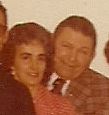
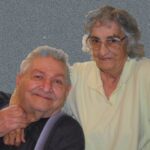 Bill Beadle became my uncle when he married my Aunt Virginia Byer. Uncle Bill was the youngest of eight children of William and Bertha (née Foster) Beadle. He was born in Worland, Wyoming, and most of his family lived there all their lives. When Uncle Bill passed away, on January 17, 2018, he was the last of the Beadle siblings. Growing up in the Worland area, which is pretty much rural Wyoming, Uncle Bill learned to love the outdoors. He loved hunting, fishing, and while hiking wasn’t as much “in style” as it is these days, I’m sure his brothers and sisters loved their outdoor adventures as much as any hiker these days.
Bill Beadle became my uncle when he married my Aunt Virginia Byer. Uncle Bill was the youngest of eight children of William and Bertha (née Foster) Beadle. He was born in Worland, Wyoming, and most of his family lived there all their lives. When Uncle Bill passed away, on January 17, 2018, he was the last of the Beadle siblings. Growing up in the Worland area, which is pretty much rural Wyoming, Uncle Bill learned to love the outdoors. He loved hunting, fishing, and while hiking wasn’t as much “in style” as it is these days, I’m sure his brothers and sisters loved their outdoor adventures as much as any hiker these days.
Another aspect of growing up in Worland, Wyoming is that most of the folks that lived there were, if not farmers and ranchers, then at the very least, cowboys. Uncle Bill was a cowboy all the way. He loved everything about the cowboy lifestyle, and especially the “Old West” which was his favorite era. I think that he could imagine himself living in that era all his life…especially in his childhood, but then, what little boy doesn’t want to be a cowboy. I know that all the little boys I know love cowboy boots, horses, and guns. It’s the simply the cowboy way of doing things, and he loved it.
Along with his cowboy values, came a desire to make sure that the nephews stayed on the right track, and if they had problems, or it looked like they were heading in the wrong direction, he would sit down with them and after talking to them a while, he could have them turned around and back in line. It was this aspect of Uncle Bill’s personality that endeared him to my cousin, Elmer. He was a successful businessman, and it was the same values that he taught the nephews that made him good at what he did. Uncle Bill spent much of his working life in the pipe yards. Then he decided to start his own rathole drilling business with his sons, Forrest and Steve by 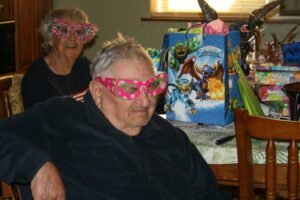 his side. While Uncle Bill was a great machinist and general all-around mechanic, his really felt alive when he was fishing and bird hunting in the Worland area with his son, Steve. I can imagine he and Steve spent a lot of time talking about their fishing trips and the times they had walked the fields hunting for Pheasant and Chukars. He loved those treks into the woods waiting for that unexpected bird to fly up out of nowhere. The hunter had just seconds to respond, and would be successful, only if he was a great hunter…and Uncle Bill was a great hunter. Today would have been Uncle Bill’s 95th birthday. I’m sure he’s out hunting (minus the gun) or riding a horse somewhere, having the time of his life. Happy birthday in Heaven, Uncle Bill. We love and miss you very much.
his side. While Uncle Bill was a great machinist and general all-around mechanic, his really felt alive when he was fishing and bird hunting in the Worland area with his son, Steve. I can imagine he and Steve spent a lot of time talking about their fishing trips and the times they had walked the fields hunting for Pheasant and Chukars. He loved those treks into the woods waiting for that unexpected bird to fly up out of nowhere. The hunter had just seconds to respond, and would be successful, only if he was a great hunter…and Uncle Bill was a great hunter. Today would have been Uncle Bill’s 95th birthday. I’m sure he’s out hunting (minus the gun) or riding a horse somewhere, having the time of his life. Happy birthday in Heaven, Uncle Bill. We love and miss you very much.
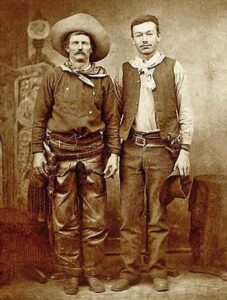
 When we think of a cowboy, we usually picture the American Cowboy, rough and rugged wearing a cowboy hat, a gun on his hip, and riding he favorite horse around the Old West. One thing we wouldn’t think of is that we really wouldn’t think of an American Cowboy being born in Canada. Nevertheless, one of the most “unusual” American Cowboys was actually born in Canada. His name was Charles Nebo, or as he was known by nickname, Charley, and he was born in March of 1842. Charles Nebo wasn’t your typical cowboy and might have even been more Forrest Gump than soldier, although he wasn’t autistic, like Forrest Gump was…or at least, not that anyone knew of.
When we think of a cowboy, we usually picture the American Cowboy, rough and rugged wearing a cowboy hat, a gun on his hip, and riding he favorite horse around the Old West. One thing we wouldn’t think of is that we really wouldn’t think of an American Cowboy being born in Canada. Nevertheless, one of the most “unusual” American Cowboys was actually born in Canada. His name was Charles Nebo, or as he was known by nickname, Charley, and he was born in March of 1842. Charles Nebo wasn’t your typical cowboy and might have even been more Forrest Gump than soldier, although he wasn’t autistic, like Forrest Gump was…or at least, not that anyone knew of.
Charlie never tried to inflate his achievements and was happy to live like a true frontier man, nevertheless, people often made him sound like he was…maybe, a little bit more of a cowboy than he actually was. I suppose it made no sense to say that he was just a “good old boy” from out west. People don’t expect that, and maybe, they just wouldn’t read about it, either, but the reality is that there were more average people in the American West than there were the wild people who made the West famous.
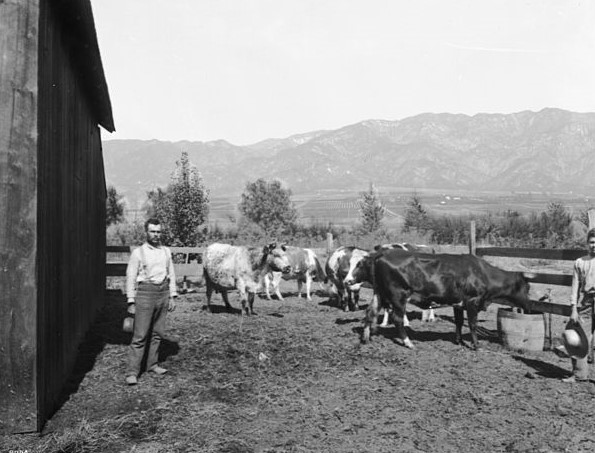
Charley Nebo lived in Canada until 1861. Then, he moved to Saginaw, Michigan. He was a Union soldier during the Civil War and went on to become a cowboy in New Mexico. At one point he actually befriended Billy the Kid. Nebo wrote about him in a letter, saying, “He wasn’t the ruthless bad fellow that Western history has made him out to be.” Nebo apparently gave people the benefit of the doubt, and himself, as a respected cowboy, once shot a man after witnessing him kill a Mexican boy’s dog. In all, Nebo was a common man, humble and capable. He wasn’t what people might call spectacular, but he was a good man, and it took a lot of those good men to build the American West.
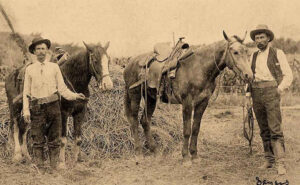 Charles Angelo “Charlie” Siringo didn’t set out to be a lawman, a detective, or a bounty hunter, but the circumstances of his life put him in places where things just fell into place to bring his future into being. Born on February 7, 1855, on the Matagorda Peninsula in Matagorda County, Texas. His mother was an Irish immigrant, and his father was an Italian immigrant from Piedmont. His father died when Siringo was a year old. Siringo attended public school until the start of the American Civil War. In 1867, when he was just 12 years old, Siringo took his first cowpuncher lessons, before moving to Saint Louis after his mother remarried.
Charles Angelo “Charlie” Siringo didn’t set out to be a lawman, a detective, or a bounty hunter, but the circumstances of his life put him in places where things just fell into place to bring his future into being. Born on February 7, 1855, on the Matagorda Peninsula in Matagorda County, Texas. His mother was an Irish immigrant, and his father was an Italian immigrant from Piedmont. His father died when Siringo was a year old. Siringo attended public school until the start of the American Civil War. In 1867, when he was just 12 years old, Siringo took his first cowpuncher lessons, before moving to Saint Louis after his mother remarried.
Siringo attended Fisk public school for a while in New Orleans, but school wasn’t really of interest to him, so he started work as a cowboy for Abel Head “Shanghai” Pierce in April 1871, after returning to Texas. He was just 16 years old, and yet he had done more in his short lifetime that most people would have dreamed of doing. And yet, that was just the beginning. In July 1877, Siringo was in Dodge City, Kansas, where he survived an encounter with Bat Masterson.
Then, Siringo started working for the LX Ranch working as a cattle drive cowboy. This was an unusual kind of cattle drive job, in that it also entailed chasing after LX cattle stolen by Billy the Kid in 1880. By 1884, Siringo 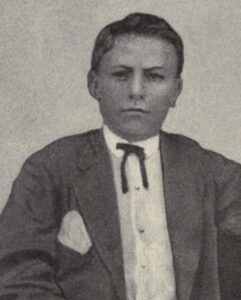 was married Mamie and he quit working for LX Ranch. He opened a tobacco store in Caldwell, Kansas. He and Mamie had a daughter named Viola, born on February 28, 1885. At this point, it seemed prudent to find a safer kind of work, so he began writing his autobiography, “A Texas Cow Boy; Or Fifteen Years on the Hurricane Deck of a Spanish Pony.” A year later, it was published and well received. Siringo moved his family to Chicago in the spring of 1886 for publication of a second printing.
was married Mamie and he quit working for LX Ranch. He opened a tobacco store in Caldwell, Kansas. He and Mamie had a daughter named Viola, born on February 28, 1885. At this point, it seemed prudent to find a safer kind of work, so he began writing his autobiography, “A Texas Cow Boy; Or Fifteen Years on the Hurricane Deck of a Spanish Pony.” A year later, it was published and well received. Siringo moved his family to Chicago in the spring of 1886 for publication of a second printing.
In 1886, Siringo witnessed the Chicago Haymarket affair. “The Haymarket affair (also known as the Haymarket massacre, the Haymarket riot, or the Haymarket Square riot) was the aftermath of a bombing that took place at a labor demonstration on May 4, 1886, at Haymarket Square in Chicago, Illinois, United States. It began as a peaceful rally in support of workers striking for an eight-hour workday, the day after police killed one and injured several workers. An unknown person threw a dynamite bomb at the police as they acted to disperse the meeting, and the bomb blast and ensuing gunfire caused the deaths of seven police officers and at least four civilians; dozens of others were wounded.”
Seeing all that destruction prompted Siringo to join the Pinkerton National Detective Agency. He used gunman Pat Garrett’s name as a reference to get the job, having met Garrett in 1880, when they were searching for Billy the Kid. Siringo was hired immediately, and assigned to Denver, reporting to James McParland. He moved his family to Denver, where his wife died in 1890, leaving him with his young daughter to raise. Eventually she went to live with his wife’s aunt and her husband, Emma and Will F Read. Siringo was then assigned several 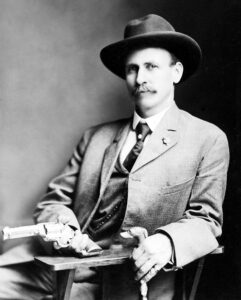 cases, which took him as far north as Alaska, for the Treadwell mine, and as far south as Mexico City. Using a relatively new technique at the time, he began operating under cover as Charles L Carter and infiltrated gangs of robbers and rustlers, making more than 100 arrests.
cases, which took him as far north as Alaska, for the Treadwell mine, and as far south as Mexico City. Using a relatively new technique at the time, he began operating under cover as Charles L Carter and infiltrated gangs of robbers and rustlers, making more than 100 arrests.
Siringo had a difficult married life, following his first wife’s death. It makes you wonder if he would have stayed married, had she lived. A second marriage in 1893 to Lillie Thomas ended in divorce after three years. They had a son named William Lee Roy. After the divorce, Lillie took their son and moved to Los Angeles. Two other marriages, one in 1907 to a woman named Grace and one in 1913 to a woman named Ellen Partain. Each of these lasted only a few months. Finally, Siringo moved to California to be closer to his children. In the end, it wasn’t his cowboy years or his detective years that really made Siringo famous, but rather his writing. Siringo was the author of seven books. Siringo died on October 28, 1928, in Altadena, California.
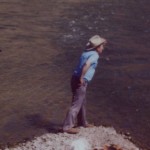
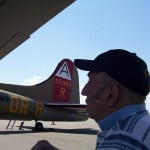 My dad was always a cowboy at heart. In his younger days, he rode horses, worked on the family farm, and did all the other cowboy type things. He listened to country music, and liked old westerns on television, or attend the rodeo. But, the one thing that that, in my opinion showed his cowboy style the best, was the cowboy hat that he so often wore. You almost never saw him in any other hat on vacation, and he wore it if they went someplace that it would fit in for. I’m quite sure he hated not being able to wear it to the places that it just wasn’t appropriate.
My dad was always a cowboy at heart. In his younger days, he rode horses, worked on the family farm, and did all the other cowboy type things. He listened to country music, and liked old westerns on television, or attend the rodeo. But, the one thing that that, in my opinion showed his cowboy style the best, was the cowboy hat that he so often wore. You almost never saw him in any other hat on vacation, and he wore it if they went someplace that it would fit in for. I’m quite sure he hated not being able to wear it to the places that it just wasn’t appropriate.
Dad always took such good care of his hat, and you could always tell that he was one of the good guys, because his hat was always white, and of course, the good guys in any old western, wore a white hat. I suppose that was like the football teams of today. If all the helmets looked alike, how would you know which team was yours. So we always knew that Dad was a good guy, because he wore a white hat.
Oh, Dad had other hats too, and in fact I can vividly see him is one of the many baseball type hats he had, and of course, there was the hat that was a tool of his trade…the hard hat. I clearly remember him in those, but I never felt like they fit his personality like the cowboy hat did. Dad was always the guy I thought of when someone said cowboy. He wore the Bolo ties, and the western belt and vest, and what cowboy would be complete without the cowboy boots, but none of that said cowboy as much as the cowboy hat.
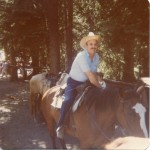
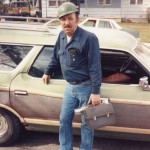
When I think of my dad, I have to say that one of my favorite pictures is of Dad on a horse with his white cowboy hat. He was doing one of his favorite things…taking his family on a vacation. They had taken a horseback ride on a trail, and Dad looked so happy. He was in his element, in the mountains on vacation, and riding a horse. Just what a cowboy would want to be doing.

